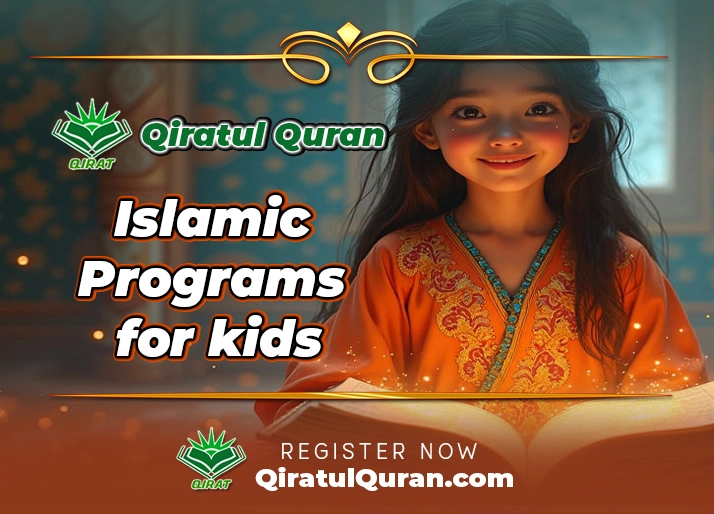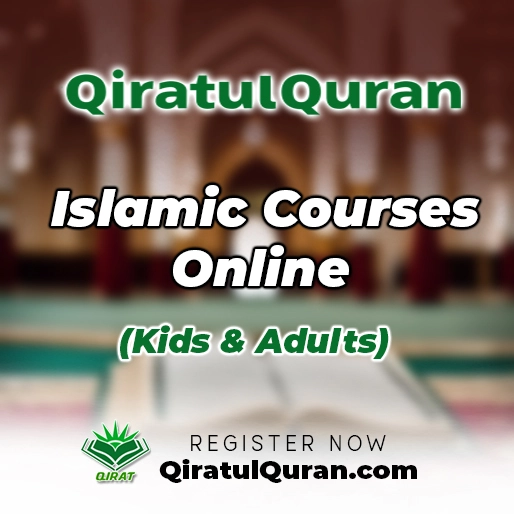Islamic Programs to Teach Kids About Islam
Islam is the second-largest religion in the world with over 1.9 billion followers. Teaching children about Islam early provides a solid foundation in the faith. Qiratul Quran institutes Islamic programs tailored for kids to help them learn engagingly.

Benefits of Islamic Programs for Children
Participating in Islamic programs has many benefits for Muslim children:
- Gain knowledge of the Quran and Hadith.
- Learn how to pray properly.
- Understand the core tenets and beliefs of Islam.
- Start building a relationship with Allah.
- Learn moral values from a young age.
- Develop a sense of community with other Muslim kids.
Starting Islamic education early allows children to grow up grounded in their faith. It helps counteract competing cultural influences they may encounter outside the home.
Types of Islamic Programs that Make Child Interest in Islam
There are various types of Islamic studies classes and other Islamic programs to meet the needs of different age groups:
Qiratul Quran Weekend Islamic School
- Offer classes once or twice a week, usually on weekends through our weekend Islamic school.
- Focus on the Quran, Arabic language, and Islamic studies.
- Geared towards elementary school-aged children.
- Provide foundational knowledge in 2-3 hours/week.
Full-Time Islamic Schools
- Offer Islamic education along with secular subjects.
- Classes held 5 days a week as a regular school.
- Provide an immersive Islamic environment for students.
- Range from preschool to high school ages.
Summer Camps
- Operate during summer vacations.
- Combine Islamic lessons with fun activities.
- Offer day camps or overnight camps.
- Great way to reinforce knowledge from the school year.
- Engage older kids and teens through workshops and service projects.
Note: Join our Summer Quran classes in Egypt
Homeschooling Cooperatives
- Bring homeschooling families together once a week.
- Parents take turns teaching the Quran and Islamic subjects.
- Enable children to socialize and learn together.
- Offer field trips and activities related to Islamic themes.
- Subjects Covered in Islamic Kids’ Programs.
Comprehensive Islamic kids’ programs educate children across a range of topics:
Quran
- Quran Memorization and Quran Recitation.
- Reading and writing Arabic.
- Explanation of verses and themes.
- Develop a love for the holy book from a young age.
Hadith and Seerah
- Learn about the traditions and sayings of Prophet Muhammad S.A.W.
- Cover events in the life of the Prophet S.A.W.
- Understand Sunnah and how the Prophet exemplified Islam.
Fiqh
- Teaches jurisprudence and foundations of Islamic law.
- Learn how to pray properly with timings and ablution.
- Understand zakat and Ramadan rituals.
Islamic History
- Covers important events and people throughout Islamic history.
- Learn about prophets mentioned in the Quran.
- Study caliphates such as Umayyad and Abbasid.
- Discuss the impact of Islam in science, math, and philosophy.
Arabic Language
- Gain proficiency in reading, writing, and speaking Arabic.
- Enables kids to understand the Quran in their original language.
- Learn Islamic terminology and phrases.
Islamic Ethics
- Explore concepts like modesty, honesty, and charity.
- Learn about haram and halal.
- Study real-life role models that exemplify Islamic ethics.
Best Practices for Islamic Children’s Programs
The most high-quality Islamic kids’ programs utilize methods and curricula tailored for each age group:
Preschool Ages
- Focus on teaching basics like the names of prophets.
- Use songs, rhymes, and physical activities.
- Keep lessons short with ample playtime.
- Incorporate arts and crafts to reinforce concepts.
Elementary Ages
- Gradually increase Quran and Hadith study.
- Use illustrated stories to explain values.
- Engage multiple learning styles through skits and art.
- Foster friendships and community spirit.
- Encourage questions and discussions.
Middle and High School
- Provide lessons on Islamic history and philosophy.
- Use research projects and debates to stimulate thought.
- Teach public speaking through speeches and khutbahs.
- Encourage volunteerism and leadership skills.
- Address relevant issues like bullying and Islamophobia.
Resources and Facilities
- Ensure teachers have proper Islamic education credentials.
- Maintain a well-stocked library of books and references.
- Provide appropriate prayer facilities for students.
- Have spaces for both structured learning and recreation.
Making Islamic Learning Fun for Kids
In addition to regular lessons, incorporating fun activities and real-world experiences makes Islamic education impactful:
- Hands-on science projects related to natural phenomena in the Quran.
- Arts and crafts like making prayer rugs and masjid models.
- Field trips to Islamic exhibits, masjids, and Muslim-owned businesses.
- Interactive computer games for learning the Arabic alphabet or Islamic trivia.
- Celebrations of Ramadan, Eid, and Islamic holidays as a community.
- Cooking traditional foods together like dates, olive oil, and pita bread.
- Character roleplaying and performances about Prophet Muhammad’s S.A.W life.
- Community service like visiting nursing homes and feeding the homeless.
You Finding programs that spark curiosity and passion for Islam in children ensures their education is meaningful and long-lasting. With the right approach, Islamic learning can be a joyful part of their childhood. Join today Qiratul Quran Institute for your kid’s Islamic career.





Pingback: Best Quran Classes for Toddlers | 3, 4 to 6 Years old Children
Pingback: Learn Quran Online for Kids in the UK - Qiratul Quran